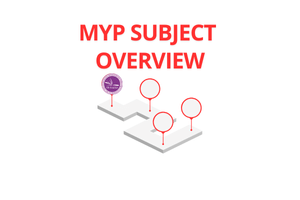Table of Contents
🔬 MYP General Science – Comprehensive Course Summary
📌 Subject Overview
MYP General Science provides students with foundational knowledge across biology, chemistry, and physics. The course emphasizes curiosity-driven inquiry, critical thinking, and understanding the relationship between science and society.
🌟 Key Features
🧪 Integrated Approach: Combines biology, chemistry, and physics in a cohesive curriculum.
💡 Inquiry-Based Learning: Encourages exploration and scientific investigation.
🌍 Societal Impact: Highlights science's role in addressing global issues.
🎯 Aims and Objectives
🔍 Foundational Understanding: Develop key principles across core scientific disciplines.
❓ Curiosity and Inquiry: Foster investigative skills through experimentation.
🧠 Critical Thinking: Enhance critical evaluation and ethical considerations in scientific contexts.
🌱 Societal Awareness: Promote awareness of science's environmental and societal impacts.
📖 Curriculum Content
🧬 Biology
Cell Structure
Ecosystems
Human Body Systems
Genetics
⚗️ Chemistry
States of Matter
Atomic Structure
Chemical Reactions
Acids and Bases
⚙️ Physics
Forces
Motion
Energy
Waves
Electricity
🔍 Scientific Methods
Experimental Design
Data Collection and Analysis
🌐 Global Contexts
🚀 Scientific and Technical Innovation: Examining science's influence on technological advancements and societal change.
🌿 Globalization and Sustainability: Investigating science’s role in environmental solutions.
🤝 Identities and Relationships: Analyzing ethical implications of scientific breakthroughs like genetic engineering.
📑 Text Types and Resources
📄 Scientific Articles and Reports
Scientific Articles
Research Reports
Case Studies
🧪 Lab Resources
Lab Manuals
Experiment Guides
Data Charts
📺 Multimedia Resources
Documentaries
Science Podcasts
Simulation Tools
📊 Reading and Data Analysis
📈 Analyzing Experimental Data: Identifying trends and anomalies.
📉 Interpreting Visual Information: Reading graphs, tables, and diagrams.
🔄 Comparing Models to Reality: Differentiating scientific theories from observed phenomena.
🖊️ Writing Skills Development
📝 Lab Reports: Articulating clear hypotheses, methodologies, and findings.
📚 Research Papers: Exploring scientific innovations and impacts.
📔 Reflective Journals: Documenting personal reflections on scientific learning and experiments.
🎤 Oral Communication Skills
🗣️ Presenting Findings: Clearly communicating experimental results.
👥 Group Discussions: Engaging in discussions about ethical issues in science.
🔬 Science Fairs: Showcasing projects and experiments publicly.
📏 Assessment Criteria
🧠 Criterion A: Knowing and Understanding: Demonstrating mastery of scientific concepts.
❓ Criterion B: Inquiring and Designing: Crafting research questions and experiments.
📈 Criterion C: Processing and Evaluating: Analyzing data to derive conclusions.
🌍 Criterion D: Reflecting on Science’s Impacts: Assessing science’s social, ethical, and environmental implications.
🔗 Interdisciplinary Units (IDUs)
🌎 Science and Geography: Exploring climate change impacts.
➗ Science and Mathematics: Analyzing experiment-related statistics.
⚙️ Science and Design: Creating prototypes for sustainability (e.g., solar energy solutions).
🚀 Sample Projects
♻️ Eco-Friendly Invention: Designing and testing sustainable solutions.
🦠 Disease Research Report: Studying disease transmission and prevention strategies.
💡 Energy Efficiency Study: Comparing energy consumption across various materials and devices.
📌 Assessment Tasks
🔍 Lab Report: Comprehensive experiment documentation.
🎙️ Research Presentation: Communicating scientific discoveries.
📝 Scientific Essay: Critical examination of ethical dilemmas in scientific advancements.
📉 Data Analysis: Interpreting experimental data to inform recommendations.
✅ Summary
MYP General Science equips students with essential scientific literacy, critical thinking, and problem-solving skills, preparing them to address complex scientific questions and engage responsibly with global scientific challenges.

